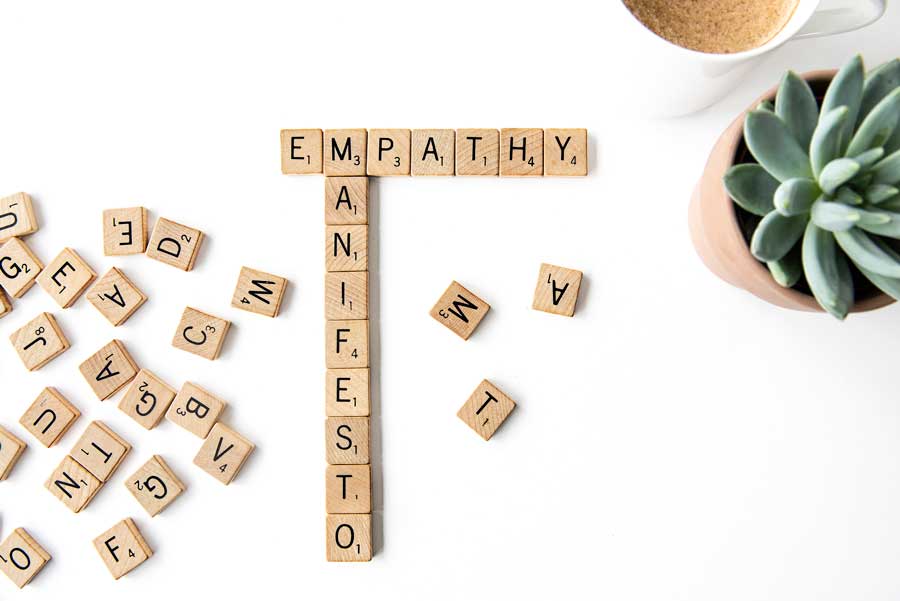The Empathy Manifesto

The Empathy Manifesto is a three-part series by business coaches Oliver Hansard and Joss Mathieson. They believe that effective leadership, organisational agility and high-performance in uncertain times all rely on excellent behavioural skills, and above all empathy.
In part 1, they explore the need for leaders to use a new suite of behavioural skills to navigate our uncertain world. In part 2, they consider how empathy can be used as a compass to create a modern, inclusive and high-performing workplace for the future. In part 3, they explain how leaders can develop the ability to lead more empathetically.
The Empathy Manifesto, Part 1: The essential leadership skill to navigate uncertainty
by Oliver Hansard and Joss Mathieson
July 2020
As we write this, organisations are having to adapt to massive and unprecedented change from the global pandemic and whiplash economy resulting from it. The familiar structures of the modern workplace are looking increasingly unfit for purpose, but there is still a lack of clarity about what is needed in their place.
In addition, employers are having to consider their position on social issues, being scrutinised more than ever on whether they are living their stated values and taking appropriate actions to be in tune with employees’ and other stakeholders’ expectations.
The challenges organisations now face to adapt, survive and thrive in this age of uncertainty are massive. It is our belief that only businesses with highly-developed and resilient behavioural skills will be equipped to successfully navigate these challenges.
Critical behavioural skills for times of change
VUCA has become a popular acronym in recent times to describe the world we are living in. It stands for Volatile, Uncertain, Complex and Ambiguous. It certainly describes the challenges that most organisations face as industries are disrupted on a daily basis, which has been further accelerated by the coronavirus pandemic.
Disruption from technology, which was already changing faster than we humans could adapt, has been further accelerated by the necessity this crisis has brought. As a result, the nature of work has already changed for millions of employees, and their expectations are shifting as a result of working differently.
The reality is that the pace of change we are experiencing now is the slowest we are going to experience; it is only going to accelerate. Faced with the economic reality and ongoing uncertainty about what recovery will look like and how long it will take, many organisations will have to make some difficult decisions and significant changes in response. Some organisations may need to do ten years’ worth of organisational change in the next ten months.
Therein lies a big dilemma. Newfound levels of trust, built up as many organisations have shown that they care about their employees, their safety and wellbeing during the pandemic, will quickly turn to suspicion if survival decisions signal that making money is more important than people.
Faced with this challenge, we are convinced that leaders and organisations will need the right skills and behaviours to survive, adapt and thrive.
As organisations respond to the challenges of our VUCA world, we believe that the next generation of successful leaders will be VUCA too – Valiant, Understanding, Compassionate and Authentic. These are the bold new leadership skills which will be essential to inspire their people through the ambiguity and gain the trust of customers and other stakeholders:
- Valiant – courageous, passionate and determined, both to be curious about other perspectives and to do the right thing
- Understanding – seeking to understand how others think and feel, including colleagues, customers and communities
- Compassionate – thoughtful, caring and kind to others, even in the most challenging of circumstances
- Authentic – genuine, honest and transparent, being true to your values, showing vulnerability as well as strength
Crucially, there is one key behavioural skill that will underpin this new VUCA leadership, help organisations navigate the uncertainty and win out in the future. That skill is empathy.
Empathy – the soft skill with hard edges
Empathy is often misunderstood. Some see it as soft, maybe a sign of weakness. Others may think they are empathetic, but in practice offer only token gestures or a few words of compassion to make people feel better.
By contrast, we believe empathy is a fundamental leadership skill that has hard edges, boosting performance in multiple ways and impacting the bottom line.
Greater empathy supports the development of a more supportive and inclusive workplace. By doing so, it enables more honest conversations and boosts curiosity, creativity and collaboration. Creating a more positive, empathetic work culture allows employees to be the best version of themselves and helps the business to thrive in the long term.
Research supports this view. An empathy index published in the Harvard Business Review found that the 10 most empathetic companies increased in value more than twice as much as those at the bottom of the index and they generated 50% more earnings defined by market capitalisation, from one year to the next.
Even before the current pandemic made empathy and trust an essential for organisational success, awareness of the importance and impact of greater empathy has been growing among senior executives. However, many CEOs and organisations have some significant empathy blind spots. According to Businessolver’s 2020 State of Workplace Empathy Survey:
- 91% of CEOs say their company is empathetic, but only 68% of employees agree
- Overall, 83% of CEOs say that organisations as a whole are empathetic, but less than half of employees (48%) say the same
- 78% of employees say empathy leads to greater motivation, and 76% say it results in greater productivity. Unfortunately, CEOs often do not see that connection – just over 50% of CEOs agreed that empathy inspired productivity and motivation
- However, 82% of CEOs believe a company’s financial performance is tied to empathy, which calls out the disconnect related to the impact of workplace empathy
In addition, the same survey reveals that organisations are not doing enough around employee wellbeing and mental health. 92% of employees say companies should be doing more to address the overall well-being and needs of their workforce. Most CEOs think they are doing a good job, with 86% of the view that their organisation is openly discussing mental health, but less than two thirds of employees (58%) agree. Given current uncertainty and high levels of anxiety for employees, addressing this is critical.
A great example of the impact that increased empathy can have is Microsoft’s performance turnaround in recent years, where empathy is driving better understanding and collaboration that has fuelled innovation. CEO Satya Nadella embodies how empathetic leadership can drive greater customer centricity and a more inclusive culture, which combined lead to business growth.
Empathy is also essential for building brand loyalty and trust with customers through emotional connections. In a 2018 survey conducted by PwC, consumers said they would pay up to 16% more for better customer service, yet 59% of all consumers feel companies have lost touch with the human element of customer experience.
How can empathy be used as a compass to successfully navigate all this change?
There is growing evidence that empathy is the critical skill for leaders to be successful in the future. The good news is that we can all develop and improve our empathy. In our coaching work with leaders and their teams, we have seen the transformative difference that empathy can make to individual, team and organisational performance.
In part 2 of this series [insert link to part 2 once posted], we will consider how empathy can be used as a compass to guide creation of a modern, inclusive and high-performing organisation for the future. Then, in part 3 of this series, we will explain how leaders can develop the ability to lead more empathetically.
If you would like to know more about empathy and the work we do, please contact us:
oliver@hansardcoaching.com; www.hansardcoaching.com
joss@changeoasis.com; www.changeoasis.com
The Empathy Manifesto
This is the second part of the Empathy Manifesto, a three-part series by business coaches Oliver Hansard and Joss Mathieson. They believe that effective leadership, organisational agility and high-performance in uncertain times all rely on excellent behavioural skills, and above all empathy.
In part 1 [insert link], they explored the need for leaders to use a new suite of behavioural skills to navigate our uncertain world. In this part, they consider how empathy can be used as a compass to create a modern, inclusive and high-performing workplace for the future. In part 3, they explain how leaders can develop the ability to lead more empathetically.
The Empathy Manifesto, Part 2: Using empathy as a compass to successfully navigate change
by Oliver Hansard and Joss Mathieson
July 2020
The pressing need for organisations to rapidly change and continuously adapt has become inescapable. However, organisations have choices about how they approach change. It is our belief that businesses with highly-developed and resilient behavioural skills will be the best equipped to successfully navigate these challenges. At the core of this is empathy.
From our work with leaders and leadership teams, we believe there are four critical dimensions to empathy, which form a useful compass to guide us through change.
The first one of these elements is empathy for oneself. For good reasons, we have heard a lot about wellbeing, resilience and mental health during the coronavirus lockdown, and the need to stay healthy and to be kind to oneself. However, being empathetic to oneself is easier to say than to do.
If you are working at home, the pressures of working life do not disappear. Indeed, they can multiply with the need to care for children, ageing parents, and/or a partner. The task of finding time for oneself, to reflect and restore, can be very difficult.
But it is essential to be kind to yourself in order to be empathetic to others. By increasing your awareness of how you are thinking and feeling, this increases your ability to bounce back from setbacks and embrace the positives you can feel grateful for, giving you a better chance to stay positive and be empathetic towards others.
Being truly empathetic towards our colleagues and customers requires curiosity and courage. Here the need is to put ourselves in the shoes of others, to understand and appreciate what they might be going through and what they need from us. The way in which we behave with others needs to reflect that understanding, for example:
- For colleagues looking after small children at home, what support do they need to be able to work differently in order that they can manage customer relationships as effectively as those who are not parenting?
- How do we effectively support customers whose financial situation is very different and more under strain than that of the organisation for which we work?
In these and many other circumstances, empathy is an essential tool which enables us to stop, listen, understand and relate to those we work with and empowers us to respond accordingly in different circumstances. Being empathetic on a person to person level is also important as individuals reflect and demonstrate the values and behaviours of their organisation as a whole. Empathy demonstrated by each employee multiplies and becomes a key enabler of a positive culture and brand experience of your wider organisation.
|
Case study: Demonstrating empathy in challenging times
Without appropriate focus, organisational empathy is nebulous, both difficult to define and difficult to identify. But with the right approach, it is a powerful tool for a business to use in the management of both its employees and its client base. One of the best examples of organisational empathy we have come across during the coronavirus pandemic is a global media company which has made it an official policy that every employee, as a part of their working day, can take two hours of work time to manage personal requirements. This might be to home-school children, look after elderly parents, or even have downtime to ensure employee mental well-being and resilience. On one level, permitting and encouraging all employees to be less “productive” seems a counterintuitive business decision. However, this organisation is taking a long-term view and, by formally adopting this as a policy, is signalling not just empathy but trust in their employees. By treating their staff well, showing they understand the strain under which employees are operating, this trust will be repaid by employees in the future. A brave move? Perhaps. However, from an empathetic perspective, this policy makes sense in terms of employee engagement and business performance. |
Being empathetic with one’s team takes a combination of self-awareness and, again, valiance. Truly understanding how your team is feeling (for example, running a staff pulse survey and then having open discussions about the results), being compassionate and understanding about what they can achieve when working remotely, and being authentic in communicating and setting goals become key factors in team success over the medium-term.
Listening, acknowledging, testing and learning are all critical activities to have the best chance of getting the most out of your team. Where these behaviours are demonstrated effectively, managers consistently ask for feedback and at the same time are authentic and honest with their teams about the business’s situation and ambition. If the business reality is kept hidden, or managers fail to listen or act on feedback, staff can become disengaged and hard-earned loyalty can be jeopardised.
In many respects, organisational empathy is the sum of self, colleague and client, and team empathy. These are the building blocks to support and enhance your company’s culture from the bottom up. However organisational empathy should be top-down as well.
An organisation’s leader must demonstrate empathetic behaviours in a clear and consistent way and must demand the same of the senior leadership team. The need more than ever is for the CEO to be the Chief Empathy Officer. In the most effective organisations, top-down empathy is reflected in the behaviour of individual leaders, colleagues and teams.
And of course, if the organisation as a whole can do this effectively, this empowers its relationships with the outside world, with customers and with the broader stakeholder base.
How to become an empathetic leader
There is little doubt that the most successful companies in the future will need to be both adaptable and financially robust. To achieve this, the value of “softer” skills cannot be underestimated and empathy will be at the apex of these critical human behaviours.
The good news is, whilst leaders need to authentically demonstrate empathy, it can be learned and developed. According to Businessolver’s 2020 State of Workplace Empathy Survey, 73% of employees believed that empathy can be learned, up from 65% in 2017. Listening, understanding and responding skills can be taught and enhanced to make individuals, and the business as a whole, more effective in the way they operate internally and in terms of how they engage with the world outside their organisation.
In part 3 of this series [insert link to part 3 once posted], we will explain how leaders can develop the ability to lead more empathetically.
If you would like to know more about empathy and the work we do, please contact us:
oliver@hansardcoaching.com; www.hansardcoaching.com
joss@changeoasis.com; www.changeoasis.com
The Empathy Manifesto
This is the final part of the Empathy Manifesto, a three-part series by business coaches Oliver Hansard and Joss Mathieson. They believe that effective leadership, organisational agility and high-performance in uncertain times all rely on excellent behavioural skills, and above all empathy.
In part 1 [insert link], they explored the need for leaders to use a new suite of behavioural skills to navigate our uncertain world. In part 2 [insert link], they considered how empathy can be used as a compass to create a modern, inclusive and high-performing workplace for the future. In this final part, they explain how leaders can develop the ability to lead more empathetically.
The Empathy Manifesto, Part 3: How to become an empathetic leader
by Oliver Hansard and Joss Mathieson
July 2020
The repercussions of the coronavirus pandemic have already begun to bite for some organisations. Redundancies have been an unfortunate early consequence. However, the way in which this has been managed has already thrown up some wildly contrasting examples of whether the leaders are empathetic or not – from the good, like AirBnB, to the truly bad.
These examples shine a light on the importance of empathy and behaving in an appropriate way. It is very difficult to keep things private within an organisation these days. Whether you demonstrate empathy becomes a clue as to your values as an organisation and whether customers and potential recruits would want to work with you. Crucially though, it’s not just empathy broadly but the type that matters.
Three types of empathy
First, and most common in organisations, is cognitive empathy, which is the ability to think about how someone else might see things. Then there is emotional empathy, which is connecting with how another person or people are feeling.
The challenge with cognitive empathy can be that there is too much emphasis on thought rather than feeling. Conversely, if you experience emotional empathy it can overwhelm. As a result, both approaches can lead to inaction.
Our own work with leaders and organisations is geared toward helping develop generative empathy.
From experience, in an organisational setting, this is usually the most appropriate type. We have found that generative empathy strikes a good balance. Done well, one is able to behave with feeling towards others whilst at the same generating insight, possibility and action. At its best, it is a critical component for truly effective empowerment and inclusion.
How do I develop generative empathy as a core leadership skill?
To act with consistent generative empathy, leaders and teams need to develop and use some key skills and behaviours. Our proprietary model is ACORN© – from small improvements in empathy, a far more effective and powerful way of working can grow:
|
A |
Attention |
Give your full and positive attention, actively listening and fully focused on the other person, free from other thoughts and distractions, not imposing your own perspective |
|
C |
Curiosity |
Be curious to really understand what the other person is saying, thinking and feeling; explore what is holding them back, what have they already tried, what else could they do? |
|
O |
Observing |
Observe closely and notice all the signals, becoming aware of more than just what the person is saying to see and understand their body language and emotions |
|
R |
Reflecting |
Be a mirror and reflect back what you are hearing, seeing, thinking and feeling to check your understanding of what the other person is experiencing |
|
N |
Next |
Support the other person to identify what action they should take next and reinforce with appropriate action of your own |
© 2020 Change Oasis Limited / Hansard Coaching
Coaching as a tool to bring the Empathy Compass© and ACORN© model together
With businesses under pressure to change, how can they best introduce and apply these critical new behavioural skills?
In our experience, coaching is a practical and powerful way to help leaders and teams develop these skills and drive positive, people-centred organisational change. A blended approach of traditional group-based work plus focussed one-on-one coaching has shown itself to be an effective way to introduce these skills.
We run a programme in which individual participants are introduced to the principles and tools of generative empathy and are then able to experiment with these in one-on-one breakout sessions. After the group work, participants are assigned a coach who is skilled in empathy, and the Empathy Compass© [insert link to part 2] and ACORN© framework are combined to develop a tailored leadership development programme.
Underpinning this, we use a coaching model which supports a shift from current reality to ideal future. By clearly envisaging where you are trying to move to and what needs to change to make it happen, this framework works powerfully at an individual and a team level, developing empathy and improving performance in parallel.
As leaders and teams make the shift towards ideal, we also help them to make it real for their colleagues and customers, bringing edge to their increasingly empathetic ways of working through valiance, understanding, compassion and authenticity
Results. Results. Results.
The results are leaders who have enhanced their ability and confidence to be more empathetic in everything they do, in order to achieve superior outcomes for themselves, their colleagues and customers, their teams and their organisations.
Feedback from our empathy coaching programmes reinforces their positive impact. In one example, individual participants judged that their ability to listen and fully understand others’ points of view had increased by almost 15% in six months as a result of the work they had done personally to increase their own empathy skills. In addition, their leadership team’s ability to behave empathetically as a group had increased by 20%.
Furthermore, participants in the programme also observed that they were listening much more, pausing before responding, and not rushing to answer or being as defensive when challenged.
|
Feedback from Empathetic Leadership programme participants: “I have realised what a powerful capability empathy is. “I think I was always quite an empathetic person to others, the problem was with myself and I have noticed a change in that I am more empathetic and kinder to myself.” “We are a more cohesive, collaborative and considerate team. The respect we have for each other’s areas of expertise is much more tangible than before and “thank you” comes more readily. We also seem to have more fun now!” |
Creating more empathetic organisations
Whilst it takes time for changes at the senior leadership level to ripple out and positively impact performance across the business as a whole, given how rapidly the world as we know it is changing we believe the need to create more empathetic leaders and organisations is both essential and urgent.
If empathy can be developed effectively at all four points of the Empathy Compass© [insert link to part 2], there is real potential for a material impact on business performance. Starting with empathy for oneself to be at one’s best, then improving one’s interactions with colleagues and customers, then increasing empathy in teams to boost honesty, creativity and collaboration, is the way to navigate through challenging and uncertain times.
It is only when empathy becomes embedded at the organisational level that an organisation will be able to fully benefit from the edge that empathy gives. However, science shows how scalable this change in behaviour is – doing the right thing and being consistently kind and empathetic to others not only makes them and us feel better, it also makes those who witness these acts feel better and more likely to act that way with others.
Empathy generates empathy in multiple ways. Imagine the powerful effect this can have through your organisation.
It starts with you.
If you would like to know more about empathy and the work we do, please contact us:
oliver@hansardcoaching.com; www.hansardcoaching.com
joss@changeoasis.com; www.changeoasis.com
Appendix – to be included in Empathy Manifesto thought paper only
A programme to build empathetic leadership
Developing an Empathetic Organisation is a six-month programme with an enduring impact. It is tailored to the culture and values of your business and designed to support your employees’ ability to thrive by establishing an increasingly respectful, empathetic and inclusive working environment. It also enhances your team’s interpersonal skills, helping you to stand out with customers in a competitive market.
Our programme typically starts with the senior leadership team and then cascades through key business areas. The programme helps leaders understand the imperative for more empathetic leadership and then equips them with a critical set of skills to develop greater empathy, become more open and inclusive and harness the full benefits of diversity. Enhanced empathy skills will also help to reinforce your organisational values.
Developing an Empathetic Organisation considers four dimensions: empathy for oneself; in the team of which you are part; for the people you work with (colleagues and customers); and finally empathy in your organisation as a whole. Critical listening, understanding and responding skills are enhanced to make participants more effective in the way they operate internally and how they engage outside your business.
Our coaches
The programme is led and facilitated by Henley Business School educated coaches, Oliver Hansard and Joss Mathieson:
Oliver Hansard: oliver@hansardcoaching.com; www.hansardcoaching.com; LinkedIn/OliverHansard
I became a coach because I was asked. I am passionate about everyone making themselves the best they can be, and believe coaching can be a key part of helping achieve this. My wide ranging career means I can support a variety of challenges and needs in a range of businesses and at all career stages. My empathetic, resolution orientated approach is designed to help customers find their own solutions to their challenges with guidance and support.
I am a former lawyer, having trained at Magic Circle City law firm Clifford Chance. After my legal career, I had a number of roles at the Tesco owned data science company dunnhumby, my last role being Corporate Development Director. Prior to starting my own coaching and consulting business I was Vice President of Data Services at cable company Liberty Global.
Joss Mathieson: joss@changeoasis.com; www.changeoasis.com; LinkedIn/JossMathieson;
I help leaders and organisations to achieve positive, people-centred change. Working together, we’ll break down the challenges you’re facing, identify what might be holding you back and what could be possible. We will define achievable actions that you can confidently take forward, and we will work to fully release your positive energy. I’m a passionate believer that energy combined with empathy transforms how we feel about ourselves, boosts our performance and inspires those around us too.
My background is in corporate communications, with deep know-how in employee engagement, culture and change. I have worked as a trusted adviser to senior leaders at international companies like Barclays and GSK for over two decades. As part of these roles, I have been a regular coach and mentor, supporting people to be their best and authentic selves, increase their impact and achieve their goals.
Find out more
If you would like to know more about empathy and the work we do, please contact us:
How do I choose a coach?
What is coaching?
Embedding training with coaching
The art of not having to be right
Many leaders have made a career out of not being right. Be that Christopher Columbus (who thought he was leaving for India for in 1492) or a myriad of current world leaders as they fumble to confront today’s complex issues. Many of the executives I work with are full...
12 Job Hunting Tips
I’ve have had more job searches and been to more interviews than I am prepared to admit. I have had lots of advice and received plenty of scars on the way through, so here come my 12 top job hunting tips if you need them at any point. If you have any feedback, please...
My personal experience of working with a coach
My first experience of being coached came shortly after being promoted to running an in-house legal team for the first time. Yes, I had plenty of experience working in legal departments, however now, as General Counsel, I was solely in charge of the department and on...
The power of praise
Pretty much everyone I talk too is eager to tell me how challenging and uncertain the workplace will be this autumn. Many businesses will be looking at getting back into their physical offices, sales teams will be working hard generates hard found revenue, and HR...
Don’t under estimate the value of your reputation
Like most of the business community, I’ve been involved in a number of crisis management meetings over the past few days as the UK comes to terms with the human and economic impact of the coronavirus pandemic. Some businesses are getting it wrong. Sports Direct seems...
Flexible working – a risk worth taking?
Some businesses work on the assumption that it’s only the big players who can afford to take the risk to even try a flexible working scheme. There was considerable press coverage recently of Microsoft Japan’s flexible working trial involving 2,300 employees taking the...








